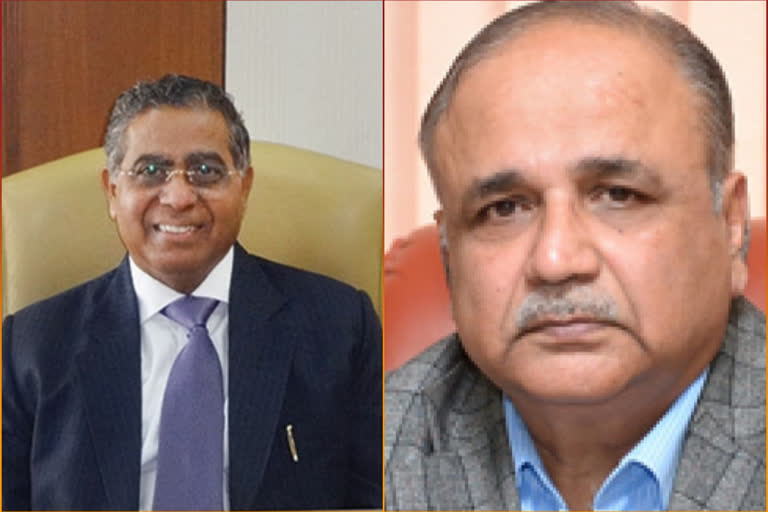New Delhi: Privatisation will bring more efficiency and professionalism in the banking sector while monetisation of assets will unlock the value of idle assets held by government companies that could be used in building new infrastructure in the country, said two top bankers in a strong endorsement of Modi government’s privatisation drive.
Mohan Tanksale, former Chairman of the Central Bank of India, says privatisation should not only mean a change in the ownership but it should also improve the productivity of the public sector banks.
“The objective should be very clear. It is not the mere change of ownership. It should be that with the change of ownership there will be less of interference, which used to be there. I think the freedom to operate efficiently and bring professionalism will definitely make a difference in the banking industry,” Tanksale told the audience in response to a question by ETV Bharat in a programme organised by Mumbai based ATM management firm EPS India.
“You can bring in productivity, you can improve the efficiency in the ratios of the corporate sector,” Tanksale told ETV Bharat while listing out the benefits of bank privatisation.
In her budget speech, finance minister Nirmala Sitharaman announced the government’s decision to privatise two public sector banks and one insurance company in the next fiscal.
The government will also dilute a 10% stake in the state-owned Life Insurance Corporation (LIC) in FY 2021-22.
Also Read: Rs 80 lakh cr public money at risk if PSBs privatised: UFBU
Talking about the benefits of privatisation, Tanksale also cites the example of private sector lender HDFC Bank, which has become the second-largest bank in the country after the State Bank of India in terms of business seize in less than three decades of its founding, leaving behind public sector banks that have 100 years old history.
In fact, the Central Bank of India, which was headed by Mohan Tanksale, was also established 109 years ago but has been left behind by private sector banks such as HDFC and ICICI in terms of business size, and branch & ATM network.
Tanksale says privatisation of banks will allow top management of a bank to stay at the helm for a longer period to drive the growth of the institution.
"The CEO of HDFC Bank was on the helm for more than 20 years whereas the top management of a public sector bank does not stay there for more than two-three years,” Tanksale noted.
Mohan Tanksale is not the only former boss of a leading public sector bank that supports the Modi government’s privatisation drive, Upendra Kamath, former CMD of Vijaya Bank, also strongly endorsed the idea.
Kamath cites the example of a large number of loss-making PSUs that are bleeding thousands of crores of rupees of public money every year.
According to the latest data given by the government in the Rajya Sabha in July 2019, there were 56 loss-making CPSUs in the country in FY 2017-18 with a negative net worth of Rs 88,556 crores and they had accumulated a loss of over Rs 1.32 lakh crore.
Also Read: Govt has no business to be in business: Modi
“Should the government keep on supporting these loss-making entities, or should it exit out of them. This is the issue,” Kamath said.
“There is a difficult choice before the government,” he told ETV Bharat.
The former boss of Vijaya Bank says a better option for the government would be to exit out without taking a big hit. “Infusion of capital could be saved which can be used elsewhere,” he noted.
Privatisation is the way forward
Mohan Tanksale, former chairman of Central Bank, says privatisation of government-owned banks is not a new idea and PJ Nayak committee has recommended dilution of government stake in public sector banks below 50% in 2014.
Today, unfortunately, the government holding in all PSBs is 85-90%, he said.
Tanksale says the privatisation of two government-owned banks and one insurance company will create a right example, which will drive more professionalism in the PSU banks.
“I very strongly feel that privatisation will definitely give us an opportunity to improve upon and create the right examples," he said.
He says India’s banking sector regulator, the Reserve Bank of India, is also trying to ensure that the commitment of private banks is as strong as that of public sector banks.
Also Read: 'Rasta Roko' over privatisation of Vizag steel plant
“You look at the niche banking such as small finance banks and payment banks, they all are private banks and each one of them are contributing towards achieving the real goal of inclusive growth and expanding the financial inclusion in the country,” he told ETV Bharat.
HS Upendra Kamath, former CMD of Vijaya Bank, which has been merged with the Bank of Baroda two years ago, says the country has a mixed economy where both public and private sector will exist but a more efficient sector will perform better.
Talking about the larger debate about the government’s role in the country’s economy in future, Kamath says, any government has no business to be in business.
“They (government) should be in governance, should look after the well-being of the needy, the downtrodden and the deprived. They should ensure the defence of the country, internal law and order,” he told ETV Bharat.
“The present government is following the right path,” observed the banker.



